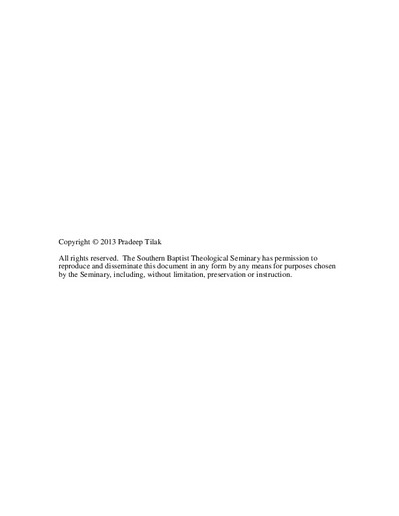A Christian Worldview Apologetic Engagement with Advaita Vedanta Hinduism
Abstract
This dissertation applies the principles of Worldview apologetics to engage Advaita Vedanta Hinduism with the biblical responses of Christianity.
Chapter 1 introduces the biblical mandate for apologetics, reviewing the contemporary apologetic scene. It highlights methodological principles in Worldview apologetics.
Chapter 2 introduces Vedanta Hinduism through the teachings of Sankara, Ramanuja, and Madhva.
Chapter 3 examines Christian rapprochement and antithesis with Vedanta Hinduism. The apologist applies Worldview apologetics in understanding the access points and biblical dividing lines.
Chapter 4 commences the apologetic engagement with proof. The Advaitin presents the monistic worldview and the ultimate reality, otherwise known as Brahman. The foundational Christian worldview is represented with the scriptures, God, man, and his salvation in Jesus Christ.
Chapter 5 addresses the offense part of apologetics. The adherents of each worldview contrast their viewpoints against the viewpoint of the other system. Vedanta's monism, impersonal reality, inclusivity, and rationality are contrasted with Christianity's historic self-revelation of God to man.
Chapter 6 handles apologetic defense through the lens of experience, epistemology, and correspondence with reality. The Hindu worldview has transcending experience, supra-rational epistemology, and deep coherence. The Christian admits a transitory universe, which has no existence as a contingent creation, apart from God.
Chapter 7 reviews Worldview apologetic practice under metaphysics, epistemology, and ethics. These deal with the ontology of reality in its manifestations and our understanding of the truth. It concludes with how we live out this knowledge today.
Chapter 8 addresses the personal, rather than technical tone of apologetics. Kierkegaard's engagement of the stubborn will helps us understand the radical nature of convictions. After presenting the Gospel worldview, the Vedanta position is shown to be impossible from those very paths that the Hindu trusts.
Chapter 9 culminates the study of Gospel-centered apologetics. The Gospel forms the core of the apologetic encounter, in content and methodology. This dissertation opens the venue for more sound arguments to be built around the Gospel and to tear down false worldviews.
Chapter 10 makes final recommendations on practical Christian apologetics to Hindus. A biblically self-aware approach is commended to honor God in the defense of the faith.

